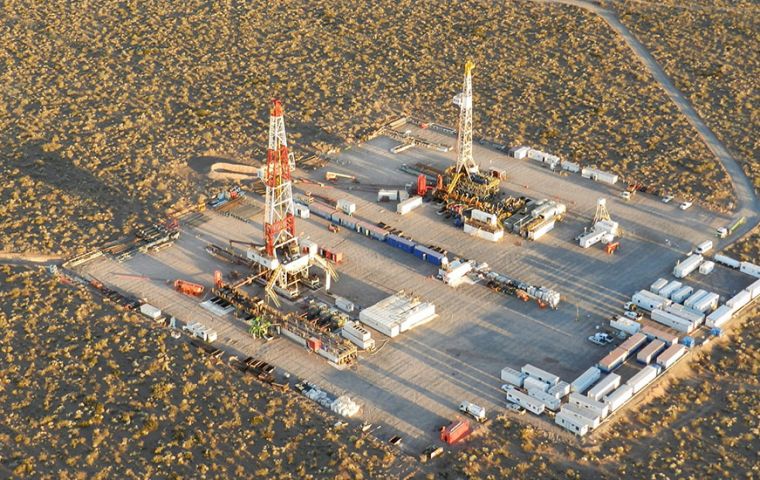MercoPress. South Atlantic News Agency
Oil and gas production in Argentina has fallen to its lowest in 25 years
 During the first five months of 2017, only 1,478,057 m3 of oil and over 18.3 billion m3 of gas were produced, an 8.1% and 0.8% drop in comparison to last year.
During the first five months of 2017, only 1,478,057 m3 of oil and over 18.3 billion m3 of gas were produced, an 8.1% and 0.8% drop in comparison to last year.  Oil decline in 2016 was attributed to a continued decrease in international prices since 2014, which at present is not surpassing US $50 a barrel.
Oil decline in 2016 was attributed to a continued decrease in international prices since 2014, which at present is not surpassing US $50 a barrel.  To remain competitive and maintain profitability, the government had to provide subsidies, and companies cut down on their workforce.
To remain competitive and maintain profitability, the government had to provide subsidies, and companies cut down on their workforce. Oil and gas production in Argentina has fallen to 1981 levels, the lowest in 25 years, despite a $14 million government subsidy for the first five months of this year. From last year to May 2017, the country has produced 2,311,736 m3 of oil and just under 3.8 billion m3 of gas, which shows a drop of 6% and 1.8% respectively.
When analyzing the first five months of 2017, only 1,478,057 m3 of oil and over 18.3 billion m3 of gas were produced, an 8.1% and 0.8% drop in comparison to the same period last year.
According to industry sources, oil decline in 2016 was attributed to a continued decrease in international prices since 2014, which at present is not surpassing US $50 a barrel. To remain competitive and maintain profitability, the government had to provide subsidies, and companies cut down on their workforce.
This trend of decline has been continuing since 1998, and the current level of production is 40% below the record high. After the international price of crude oil dropped from US$100 to US$30 in 2016, oil and gas companies pressured President Macri to subsidize US$125 million to save 5,000 jobs for six months. As international prices are still too low, the subsidies are only a temporary measure that cannot fix the long-term decline.
In the case of gas, according to the current director of YPF Emilio Apud, even though gas extraction has grown due to yields in Vaca Muerta in Argentina’s Neuquén province, “companies that had costs above a barrel of Argentine oil chose to stop deposits.” He also stated that labor strikes affected production.
“The subsidies for the price of a barrel of Argentine oil are still not giving results. This requires a new exploratory policy with immediate investments to recover the matter’s neglect of 25 years and reverse the trend,” said president of the Argentine Energy Institute Jorge Lapeña to El Cronista.
Experts are worried about the state of Argentine gas and oil production. According to director of energy consulting firm G& G Daniel Gerold, Argentina may have to import what it cannot profitably produce if production continues to fall.




Top Comments
Disclaimer & comment rules-

-

-

Read all commentsIt's a trend, reekie, in the area of declining petroleum production. Do you not understand the concept of trends?
Jul 12th, 2017 - 09:45 pm +5Here is another trend for you: when your country has little to nothing to offer in goods and services for prices that markets are willing to pay, don't expect that people will continue to be employed.
Low productivity, high taxation, and high labour rates: a portrait of the trends in Argentina.
In the news:
Argentine labour rates are 50 percent more than those of Brazil.
And it just stands to reason that since Argentine workers are over-paid, that they should also be over-taxed. Income tax in Argentina is the highest in Latin America, if we believe the studies.
Gotta pay those ñoquis somehow.
“Argentina closer to energy self sufficiency” Mercopress note, March 2017. Um, maybe not.
Jul 12th, 2017 - 01:54 pm +4“...This trend of decline has been continuing since 1998,....” Yup. Mostly peronist years.
According to local media, nafta (petrol) pricing in Argentina now the second-highest in South America, after Uruguay..... in spite of the country having vast oil and gas reserves.... that it just can't seem to develop efficiently. High labour costs with excess employees, and prohibitive local royalties, keep average production costs above US$50 a barrel. During a 5-year period of the CFK regime, typical well-drilling costs increased over 80%, largely due to padded labour and inflation.
Once again, Kamearad/Komrade Rique says : “Blah blah blah blah Macri. Blah blah blah blah blah blah blah Macri. Blah blah blah blah blah blah Macri blah blah blah.”
Jul 13th, 2017 - 07:02 pm +1Of course he is merely exercising his right as an SJW (Socialist Justicialist Wrecker,) in an attempt to draw attention away from how much damage was done by the previous Peronist regime to the oil industry after it's seizure by the government...
http://3.bp.blogspot.com/-IOU-X8U759Q/T5XuG-ySq0I/AAAAAAAABIc/d6GYFy14by8/s400/AXEL-KICILLOF-YPF-300.jpg
News flash, the “Dead Cow” is still dead!
Commenting for this story is now closed.
If you have a Facebook account, become a fan and comment on our Facebook Page!